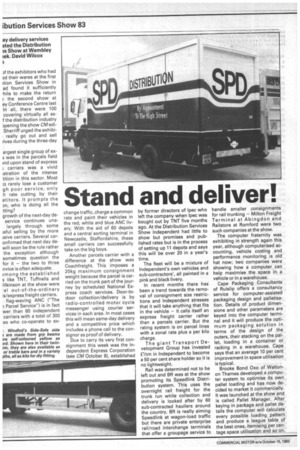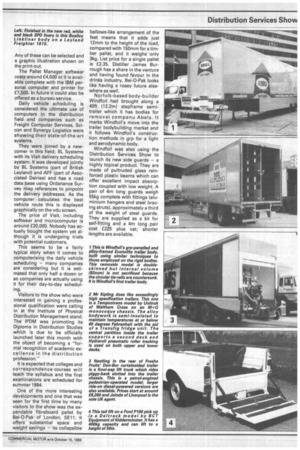Stand and deliver!
Page 84

Page 85

If you've noticed an error in this article please click here to report it so we can fix it.
ay delivery services ated the Distribution Show at Wembley )ek. David Wilcox
Df the exhibitors who had 3c1 their wares at the first ition Services Show in ad found it sufficiently ,hile to make the return ) the second show at ey Conference Centre last In all, there were 100 covering virtually all asf the distribution industry )pening the show CMediSherriff urged the exhibi
really go out and sell ;ives during the three-day
argest single group of ex5 was in the parcels field Ind upon stand of express ; carriers was a vivid stration of the intense tition in this sector. Most :o rarely lose a customer gh poor service, only h rate cutting by their etitors. It prompts the Dn, who is doing all the tting?
growth of the next-day deservice continues unalargely through some ;sful selling by the more ;sive carriers. Several caronfirmed that next day dewill soon be the rule rather the exception although sometimes question the for it — the two to three ;rvice is often adequate. Imong the established s like TNT, Tuffnells and iiikinson at the show were -al out-of-the-ordinary s/express freight carriers. flag-waving ANC ("The 1 Parcel Service") is in fact wer than 60 independent carriers with a total of 300 es who co-operate to ex
Windfoil's Side-Safe side ; are made from grp beams ore self-coloured yellow as ord. Shown here in their twinrm, they are also available as or treble bars and in a variety rths, alias kits for diy fitting.
change traffic, charge a common rate and paint their vehicles in the red, white and blue ANC livery. With the aid of 60 depots and a central sorting terminal in Newcastle, Staffordshire, these small carriers can successfully take on the big boys.
Another parcels carrier with a difference at the show was Coachfreight. This imposes a 20kg maximum consignment weight because the parcel is carried on the trunk part of the journey by scheduled National Express coach services. Door-todoor collection/delivery is by radio-controlled motor cycle messenger using courier services in each area. In most cases this will mean same-day delivery and a competitive price which includes a phone call to the consignor as proof of delivery.
Due to carry its very first consignment this week was the Independent Express Corporation (see CM October 8), established by former directors of 4:lee who left the company when lpec was bought out by TNT five months ago. At the Distribution Services Show Independent had little to show but promises and published rates but is in the process of setting up 11 depots and says this will be over 20 in a year's time.
The fleet will be a mixture of Independent's own vehicles and sub-contractors', all painted in a pink and black livery.
In recent months there has been a trend towards the removal of consignment size restrictions and Independent stresses that it will take anything that fits in the vehicle — it calls itself an express freight carrier rather than a parcels carrier. But the rating system is on parcel lines with a zonal rate plus a per kilo charge.
The giant Transport Development Group has invested f1/2m in Independent to become a 50 per cent share holder so it is no lightweight.
Rail was determined not to be left out and BR was at the show promoting its Speedlink Distribution system. This uses the overnight rail freight for the trunk run while collection and delivery is looked after by 60 sub-contracted hauliers around the country. BR is really aiming Speedlink at wagon-load traffic but there are private enterprise rail/road interchange terminals that offer a groupage service to handle smaller consignments for rail trunking — Milton Freight Terminal at Abingdon and Railstore at Romford were two such companies at the show.
The computer fraternity was exhibiting in strength again this year, although computerised accounting, vehicle costing and performance monitoring is old hat now; two companies were showing how a computer can help maximise the space in a vehicle or in a warehouse.
Cape Packaging Consultants of Ruislip offers a consultancy service for computer-assisted packaging design and palletisation. Details of product dimensions and other parameters are keyed into the computer terminal and it will produce the optimum packaging solution in terms of the design of the outers, their stacking on the pallet, loading in a container or racking in a warehouse. Cape says that an average 10 per cent improvement in space utilisation is typical.
Brooke Bond Oxo of Walton on Thames developed a computer system to optimise its own pallet loading and has now decided to market it commercially. It was launched at the show and is called Pallet Manager. After keying in package and pallet details the computer will calculate every possible loading pattern and produce a league table of the best ones, itemising per centage space utilisation and so on. Any of these can be selected and a graphic illustration shown on the print-out.
The Pallet Manager softwear costs around £4,500 or it is avail able complete with the IBM personal computer and printer for £7,500. In future it could also be offered as a bureau service.
Daily vehicle scheduling is considered the ultimate use of computers in the distribution field and companies such as Freight Computer Services, Sc con and Synergy Logistics were showing their state-of-the-art systems.
They were joined by a newcomer in this field; BL Systems with its Visit delivery scheduling system. It was developed jointly by BL Systems (part of British Leyland) and AFF (part of Asso ciated Dairies) and has a road data base using Ordanance Sur vey map references to pinpoint the delivery addresses. As the computer calculates the best vehicle route this is displayed graphically on the vdu screen.
The price of Visit, including softwear and microcomputer is around £20,000. Nobody has actually bought the system yet although it is undergoing trials with potential customers.
This seems to be a fairly typical story when it comes to computerising the daily vehicle scheduling many companies are considering but it is esti mated that only half a dozen or so companies are actually using it for their day-to-day scheduling.
Visitors to the show who were interested in gaining a profes sional qualification were calling in at the Institute of Physical Distribution Management stand.
The IPDM was promoting its Diploma in Distribution Studies which is due to be officially launched later this month with the object of becoming a "formal recognition of academic excellence in the distribution profession."
It is expected that colleges and correspondence courses will teach the syllabus and the first examinations are scheduled for summer 1984.
One of the more interesting developments and one that was seen for the first time by many visitors to the show was the expendable fibreboard pallet by Bel-O-Pak of ,London, SE11. It offers substantial space and weight savings its collapsible bellows-like arrangement of the feet means that it adds just 12mm to the height of the load, compared with 150mm for a timber pallet, and it weighs only 3kg. List price for a single pallet is £2.35. Distiller James Burrough has a share in the venture and having found favour in the drinks industry, Bel-O-Pak looks like having a rosey future elsewhere as well.
Norfolk-based body-builder Windfoil had brought along a 40ft (12.2m) stepframe semitrailer which it has bodies for removal companu Abets. It marks Windfoil's move into the trailer bodybuilding market and it follows Windfoil's construction methods in grp for a light and aerodynamic body.
Windfoil was also using the Distribution Services Show to launch its new side guards a highly topical product. They are made of pultruded glass reinforced plastic beams which can offer excellent impact absorption coupled with low weight. A pair of 4m long guards weigh 55kg complete with fittings (aluminium hangers and steel bracing struts), approximately a third of the weight of steel guards. They are supplied as a kit for self-fitting and a 4m long pair cost £225 plus vat; shorter lengths are available.






















































































































